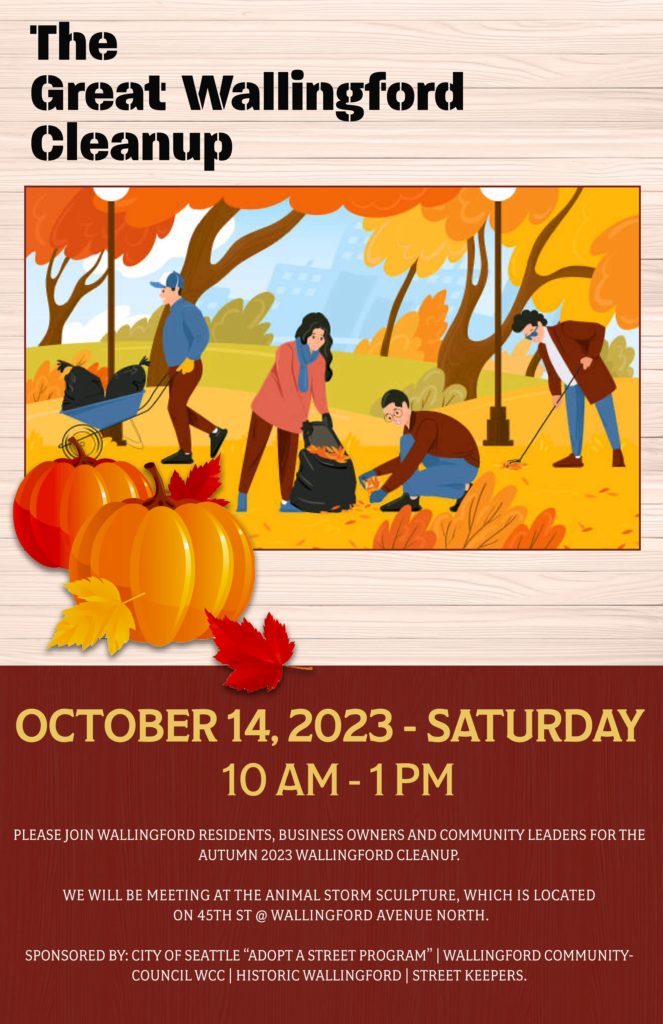Saturday, October 14, 2023, 10am – 1pm
All are welcome! Meet at the Animal Storm Sculpture on the corner of 45th Street and Wallingford Ave. N, across from QFC.


All are welcome! Meet at the Animal Storm Sculpture on the corner of 45th Street and Wallingford Ave. N, across from QFC.

Location: Room 202 of the Good Shepherd Center, 4659 Sunnyside Ave N.
Volunteers Needed – Creative project to replace the banners along 45th Street:
Have an interest in joining the Wallingford Community Council in collaboration with other volunteer neighborhood organizations? This project needs outreach, project coordination, and creativity – does any of that sound like you? If so, please email pres@wallingfordcc.org to get connected.
Do you agree that the recently passed Tree Ordinance 126821 has some holes to be filled? Holes like not being in compliance with the city’s comprehensive plan, and forgetting to include tree protection during property development.
There is a city-wide movement to amend the legislation to bring it into compliance with the City’s own 2035 Comprehensive Plan goals (30% coverage by 2037), as well as the state Growth Management Act.
To learn more about this movement, go to: www.seattleneedstrees.com
One can also get a better idea of the benefits of amending the Tree Ordinance from this Seattle Times article by Naomi Ishisaka, “Yes, Seattle, we can have both housing and trees.”
Creative project to replace the banners along 45th Street: Have an interest in joining the Wallingford Community Council in collaboration with other volunteer neighborhood organizations? This project needs outreach, project coordination, and creativity – does any of that sound like you? If so, please email pres@wallingfordcc.org to get connected 🙂
You are invited! 🙂
The North Seattle Districts 4, 5, and 6 will be from 6pm – 7 pm. Wallingford is in Districts 4 & 6.
Central and the South Seattle Districts 1, 2, 3, and 7 will be from 7pm – 8:15 pm.
Plan to come to one or both. Click here to join via zoom
13 of 14 candidates have said yes, and only one had a conflict! Click here for more information!
Each candidate will have 90 seconds for an introduction. The questions will concern density, affordable housing, our tree canopy and how they fit in our Comprehensive Plan. There will also be a lightning round of six Yes/No questions.
The forums will be recorded and posted at www.seattlefairgrowth.org. Please direct questions about the forums to Sarajane Siegfriedt Sarajane3h@comcast.net.
Click here for a map of the “as of January, 2024” Seattle City Council Districts.
Big thank you to Seattle Fair Growth for their outreach and work to pull together and moderate this candidate forum.
Co-Sponsors Include:
NOTE: The Wallingford Community Council does not support nor endorse individual candidates.

The Wallingford Kiddie Parade is 11AM, Saturday, July 15th!
Parade Route is along N 45th, starting at Bagley N. and ending at Interlake N.
What makes this parade special is that it is all about the kids marching in the parade!
This year’s theme: Halloween in July! Bring kids in their Halloween costumes to Bagley N. & 45th, and if you are joining them – don’t forget to dress up, as well!
For more information about participation, here’s your LINK
The Great Parade Float Bonanza: We encourage people to create cool floats! Blake Garfield, (Celebrate Wallingford Board President) has a couple trailers to loan to folks who’d like to create a parade float. Yes, there’s NO rental fee! He’ll even deliver it to your door. The only commitment is your promise to turn yours into something fantastic. Intrigued? Want to enter? Find out more LINK
A little community history: This parade is Seattle’s oldest parade. It began as a Kiddie Parade and throughout the years has had several different faces. The event nearly fell into such disrepair that it was questionable whether it would survive. But survive it has. Celebrate Wallingford is a brand-new neighborhood non-profit created especially to produce the parade. Wallingford Parade is for everyone in the neighborhood, and out! Parade route is from Bagley N to Interlake N on N 45th. Everyone is welcome. More info: Parade | Wallingford Parade (celebratewallingfordwa.org)
This is a community event by, for, and in YOUR neighborhood. Help make it happen! Love a Parade? Volunteer HERE and/or Join the Board!
To Sponsor / Donate, click HERE